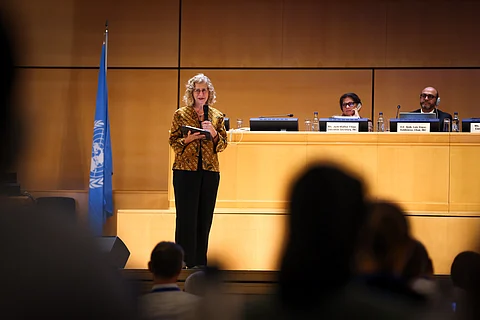

UNEP chief Inger Andersen warns that the world is “on the brink” of a historic treaty to end plastic pollution.
Nations meet in Geneva for INC‑5.2, the decisive round of negotiations on a legally binding global plastics agreement.
Talks follow years of diplomacy since the 2022 UN Environment Assembly resolution, but key points of contention remain.
Stakeholders, from waste pickers to youth activists, are credited with keeping pressure on governments to act.
The world is “on the brink” of agreeing a historic treaty to end plastic pollution, the head of the United Nations Environment Programme (UNEP) said in Geneva on August 5, 2025, as nations reconvened for the final stretch of negotiations on a legally binding agreement.
Inger Andersen, UNEP’s executive director, told delegates at a multistakeholder forum hosted by the Swiss government that the next 10 days would be critical in determining whether governments could reach consensus on a treaty that has been three and a half years in the making.
This is a treaty the world wants and needs... Plastic pollution is in nature, in our oceans, in our very bodies, where it does not belong … There is a path to a treaty even if it may be narrow.
Inger Andersen, UNEP’s executive director
The talks, known as INC‑5.2, are the second part of the fifth session of the Intergovernmental Negotiating Committee (INC) to develop an international instrument on plastic pollution. They will run from August 5 to 14, 2-25 at the Palais des Nations, the UN’s European headquarters.
Negotiations follow a series of intensive consultations, including the first part of the session in Busan, South Korea, last November. That meeting produced a “Chair’s Text” and a draft report outlining points of convergence, but also highlighted areas where major differences remain — such as the scope of production limits and the extent of financial and technical support for developing countries.
Andersen urged member states to keep the focus on “a future free of plastic pollution that allows everyone to prosper,” and credited stakeholders — from scientists and civil society groups to waste pickers and youth advocates — for keeping pressure on governments and spotlighting the health and environmental risks of plastic.
“It took a global village to bring us to this point,” she said, noting that community action and early private‑sector innovation had already demonstrated solutions.
The Geneva talks are the culmination of a process launched by the unanimous adoption of UN Environment Assembly Resolution 5/14 in 2022, which set in motion the drafting of a legally binding global agreement. Regional consultations were held on 4 August to prepare for the resumed session.
If governments can strike a deal this month, the treaty would mark the first comprehensive international effort to curb plastic pollution, including in the marine environment, and could shape the future of global production, consumption and waste management for decades to come.